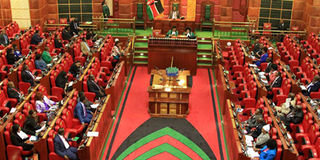Whose interests are the MPs fronting, citizens’ or parties’?

Members of Parliament hold a session on November 21, 2018. Lack of quorum has become synonymous with Parliament over the years. PHOTO | FILE | NATION MEDIA GROUP
What you need to know:
- Our democracy then falters when constituents fail to have their representatives air their grievances or represent them on matters that concern their welfare.
- It is time we said goodbye to quorum hitches and got Parliament working on its mandate.
In the week that Chief Justice David Maraga gave us the insight of the interference of independence of key institutions of government, Parliament voted to repeal the interest rate cap.
The cap had been set under Banking Act 2016 at not more than four per cent above the Central Bank’s lending rate in order to make it affordable for most Kenyans to borrow.
It is unclear what precipitated the amendments to the Banking Act, but the move has not failed to raise a few eyebrows.
One is the speed with which changes to the law were initiated. This came just three years after the interest cap was set by the same Parliament.
The other is the style in which the amendment to such a crucial law were made — amid reports that there was a quorum hitch in Parliament to veto the changes, if required.
AFFORDABLE LOANS
Lack of quorum has become synonymous with Parliament over the years.
And it only occurs either to stymie the rights of Kenyans — as was the case with the two-thirds gender rule or the recent case where the cap on interest charged by banks was removed with potential financial implications for ordinary Kenyans.
It now means banks will, once more, charge interest as they please on loans that they extend to their customers.
The rule comes at a time when the economy is on a nosedive.
Basic rules of economics would intimate that loans are made as affordable as possible to encourage more borrowing and spending in a bid to spur economic growth.
Affordable loans will encourage investment across the board. Higher interest rates are bound to favour the banks and oppress ‘Wanjiku’.
MANDATE
The MPs’ removal of the interest rate cap and their hesitation in enacting the constitutional two-thirds gender rule are just two examples that we need to use to gauge our democracy: the definition of democracy is, “a government of the people, by the people and for the people”.
Whether that is a presidential or parliamentary system is immaterial.
The Constitution defines it even better in Chapter 8 (94) (1) when it states: “The legislative authority of the Republic is derived from the people and, at the national level, is vested in and exercised by Parliament.”
One would, then, assume that MPs are, by obligation, in Parliament to represent the views and concerns of the people, who elected them.
Again, Chapter 8 (95) (2) on the role of Parliament encapsulates the key issue that takes MPs to Parliament in the first place: To “deliberate on and resolve issues of concern to the people”.
QUORUM HITCHES
Our democracy then falters when constituents fail to have their representatives air their grievances or represent them on matters that concern their welfare.
When quorum hitches occur in Parliament, and if it is due to an ‘act of God’, for instance, it is understandable.
But if it manifests through underhand deals — such as financial inducements, free beach holidays or using the voting time for luxurious activities — to frustrate the vote in favour of a third party (be it the Executive or lobbyists), then we have no democracy to speak of.
Parliament, just as ordinary citizens and other state organs, is meant to carry out their activities within the ambit of the law.
If an MP is legally meant to represent constituents but decides not to be in Parliament or sell his veto for selfish gain, it is time we, the people, started to ask the hard questions — such as where our MP was when we could not afford a mortgage, because they were not there to tell Parliament their constituents are too poor for prime mortgages and save them from loan sharks!
SEPARATION OF POWERS
MPs not being able to vote by following their conscience is anathema to a democracy.
It brings to question the whole notion of separation of powers, which has been discussed last week following claims of interference of the Judiciary by the Executive.
No one is saying a ruling party cannot mobilise its members to stand behind an issue of its interest in Parliament.
But if an MP feels the issue goes against the interest of his constituents or his conscience, then he should have the will to vote as he likes with no fear of reprisal.
Politics is, after all, about people and less about lobbyists hiding behind their cronies in government to influence Parliament.
The only way to lock out third parties with vested interests that are detrimental to the mwananchi is to drum into the arms of the government the true meaning of the separation of powers and the legal responsibilities our representatives have.
QUALITY WORK
Parliament is not the place to play politics with the lives and livelihoods of Kenyans.
It is where the welfare of the people needs to be discussed and improved upon.
It is time we said goodbye to quorum hitches and got Parliament working on its mandate.
Its success will be measured by the decent quality of life for the investment banker as well as the jua kali artisan.
Ms Guyo is a legal researcher. [email protected] @kdiguyo





